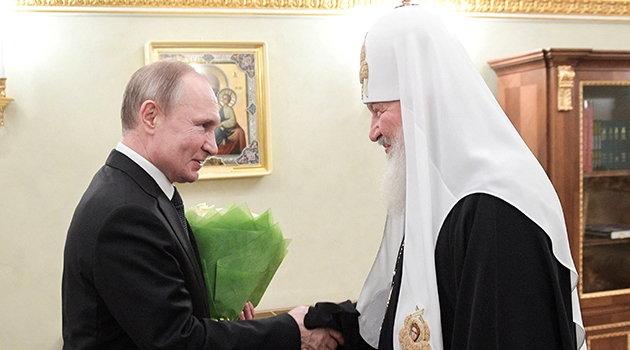Putin’s vision of a conservative orthodox superpower
Following traditional, conservative and Christian Orthodox ideals, in contrast to the “morally adrift” West, and defending Russia as a superpower. These are crucial themes in how Russia perceives and defends its invasion of Ukraine, thinks Maria Engström, Professor of Russian, who has been studying conservative trends in Russia for 15 years.
“Many conservative thinkers in Russia have never thought of post-Soviet Ukraine as a country in its own right. Instead, they see it as a creation of the Soviet Union’s administrative borders, a province or region. In Russian, Ukraine is even known as Malorossiya – ‘Little Russia’.”
Historically, Ukraine and Russia have been closely intertwined for a very long time, in terms of both countries’ culture and their shared Christian Orthodox identity. Many Russian families also have close relatives in Ukraine. When the country chose to gravitate towards the West, this was seen by Putin – and many of his compatriots – as a serious threat to Russia’s security and national self-image, Engström says.
“Putin has promised his people that no war will be fought on Russian soil. The so-called ‘special military operation’ in Ukraine is believed to be necessary because otherwise NATO will attack Russia. Ukraine has stated its intention to join NATO and the EU and no longer be neutral. In 2014, Russia launched an assault on Crimea to reclaim the area since, according to the Kremlin’s assertion, NATO was planning to set up military bases there. With this argument, Putin legitimised the annexation of Crimea.”
Ideological motives
However, she also sees ideological motives for the invasion. In her research, she has studied how visions of restoring an Orthodox realm have emerged in intellectual circles among conservative Orthodox Christians. The realm they imagine, “the Russian World”, would comprise Russia, Belarus and Ukraine. According to this view, the invasion of Ukraine is a matter not only of security policy, but equally of protecting this Orthodox realm from moral decay emanating, in particular, from the US and the West, which are portrayed as the Antichrist and must be held at bay, she explains.
“Post-Soviet political Orthodoxy dates back to the mid-’90s, but the idea arose back in the early 19th century in conservative circles with notions of Orthodox imperialism. After the fall of the Soviet Union in 1991, Orthodoxy became something of a quasi-ideology in Russia, replacing communism. The Church had been banned in the Soviet Union, but in the ’90s Russia underwent an Orthodox renaissance.”
Considerable influence
Engström says this anti-Western conservative group makes up no more than about 10% of Orthodox intellectuals in Russia. Nonetheless, they have gained considerable influence over Russian politics.
“Their ideas fit very well into populist thinking. The majority in Russia have been worse off since the Soviet Union’s fall. The transition to capitalism was swift and financially ruinous for many. Putin came to power with the promise to re-establish Russia as a superpower. Putin isn’t crazy: he has a plan and follows it, step by step,” Engström says.
Department of Modern Languages.
“The motive for the war is revanchist. He wants to take back Ukraine, not conquer new territories. The aim is to establish an Orthodox empire.”
But how religious is Putin himself?
“The image people have is that he’s a believer. He goes to church and is said to have a confessor, who gives him advice on spiritual and political issues.”
Engström sees Putin’s statement on nuclear weapons – that they may come to be used against any countries that launch a nuclear attack on Russia – as entirely in line with the ideas of political Orthodoxy.
“As the true believers see it, Russia has two sources of protection: Orthodoxy and nuclear weapons. Together, they’ll ensure no one can beat Russia. If anyone attacks, Russia will respond. Why should the world exist if Russia doesn’t? That’s what Putin argues.”
Åsa Malmberg

